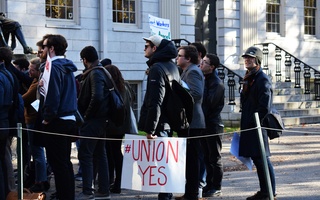{shortcode-e5e9327d8dfdca094672a6f7f75d1f3e6f995425}
UPDATED: February 9, 2018 at 4:15 p.m.
students opposed to unionization cited disparities in resources between Harvard Graduate Students Union-United Automobile Workers and students critical of the union as one of their top concerns in the upcoming second unionization election in April.
HGSU-UAW opponents argued that United Automobile Workers’ backing gives the student union an unfair advantage in its efforts to convince eligible students to support unionization. HGSU-UAW officially partnered with the UAW, which is also affiliated with graduate unions at Columbia and NYU, in 2015.
Though there is no formal organization representing students who oppose HGSU-UAW, some students who are against unionization participate in a loosely organized group, “Against HGSU-UAW.”
Physics graduate student Jae Hyeon Lee, who created the group, said the lack of institutional representation makes it difficult to reach out to potential voters and counter HGSU-UAW’s arguments.
“A primary challenge for those who oppose the unionization is that we don't have all the financial, time, and human resources the UAW provides to its supporters to effectively communicate with other students at large,” Lee wrote in an email.
“The union has an essentially unlimited and privileged access to our contacts whereas that's clearly [not] the case for an average student with an opposing view due to a general lack of institutional representation.”
Mark R. Lipstein, a graduate student in biological and biomedical sciences who also opposes HGSU-UAW’s organizing efforts, said he disagreed with the decision to hold a new election. The National Labor Relations Board ordered the second election after accepting HGSU-UAW’s objections over the accuracy of the University-generated eligible voter list for the original Nov. 2016 election.
University attorneys had argued in proceedings before the NLRB that HGSU-UAW’s ability to contact eligible voters was not hampered by potential errors in the voter list.
“What amazed me and others was the fact that the NLRB was ignorant of the vast imbalance of organizational and monetary resources the UAW is imbued with,” Lipstein said.
Lipstein also criticized the unionization effort for a lack of communication with graduate students about its financial ties to the national UAW. If pro-unionization students prevail in April’s election, all graduate students will become part of the bargaining unit, regardless of their position on the union. Graduate students would nonetheless have to vote to approve any contracts negotiated by HGSU-UAW after unionizing.
“No one has any idea how they plan to actually spend the money we will all be forced to contribute,” Lipstein said. “They have shown some sketchy pie charts showing that a significant portion of money collected goes to the national UAW, so, in effect, do they stand to profit off of unionizing new schools?”
Benjamin Z. A. Green, a graduate student in computer science and HGSU-UAW organizer, wrote in an email that the union has been “transparent as possible” in articulating the purpose of the graduate student union’s financial ties with UAW.
“Thus far, the resources from the UAW have primarily gone toward a couple causes. The first is paying student organizers—these are grad students who spend 20+ hours per week away from their own research in order to support a union that will improve the lives of Harvard’s graduate student body,” Green wrote.
“The second was challenging Harvard’s disenfranchisement of hundreds of eligible voters in last fall’s election. Without the UAW’s resources, we never would have been able to challenge Harvard's violations of labor law so that we could have a new and fairer election this spring,” Green added.
Green cited HGSU-UAW’s advocacy for international students and lobbying against the proposed tuition waiver tax as examples of the need for affiliating with a larger national organization.
“This helped us defeat the GOP grad tax, it helps us advocate for stronger protections for international students, and it makes us stronger when we face new national challenges going forward,” Green wrote.
This story has been updated to reflect the following correction:
UPDATED: February 9, 2018
Due to an editing error, a previous caption accompanying a photo included in this story incorrectly asserted that Wednesday marks the first day of voting on whether the graduate students will form a union. In fact, that vote took place several months ago.
—Staff writer Shera S. Avi-Yonah can be reached at shera.avi-yonah@thecrimson.com. Follow her on Twitter at @saviyonah.
—Staff writer Molly C. McCafferty can be reached at molly.mccafferty@thecrimson.com. Follow her Twitter at @mollmccaff.Read more in University News
Harvard Law Review Elects Michael Thomas Next PresidentRecommended Articles
-
Harvard: Drop the AppealUsing the University’s resources to deny graduate workers their democratic right to a free and fair election on unionization—whatever the results of that election—is a misuse of funds.
-
 At 'Drop the Appeal' Rally, HGSU-UAW Presents Petition to Mass. Hall
At 'Drop the Appeal' Rally, HGSU-UAW Presents Petition to Mass. Hall -
 In NLRB Pro-Union Columbia Decision, Some See Ties to Harvard
In NLRB Pro-Union Columbia Decision, Some See Ties to Harvard -
 Some Undergrad TFs Unaware of Potential Impacts of Unionization
Some Undergrad TFs Unaware of Potential Impacts of Unionization -
 College Democrats Endorse Graduate Student Unionization Efforts
College Democrats Endorse Graduate Student Unionization Efforts













